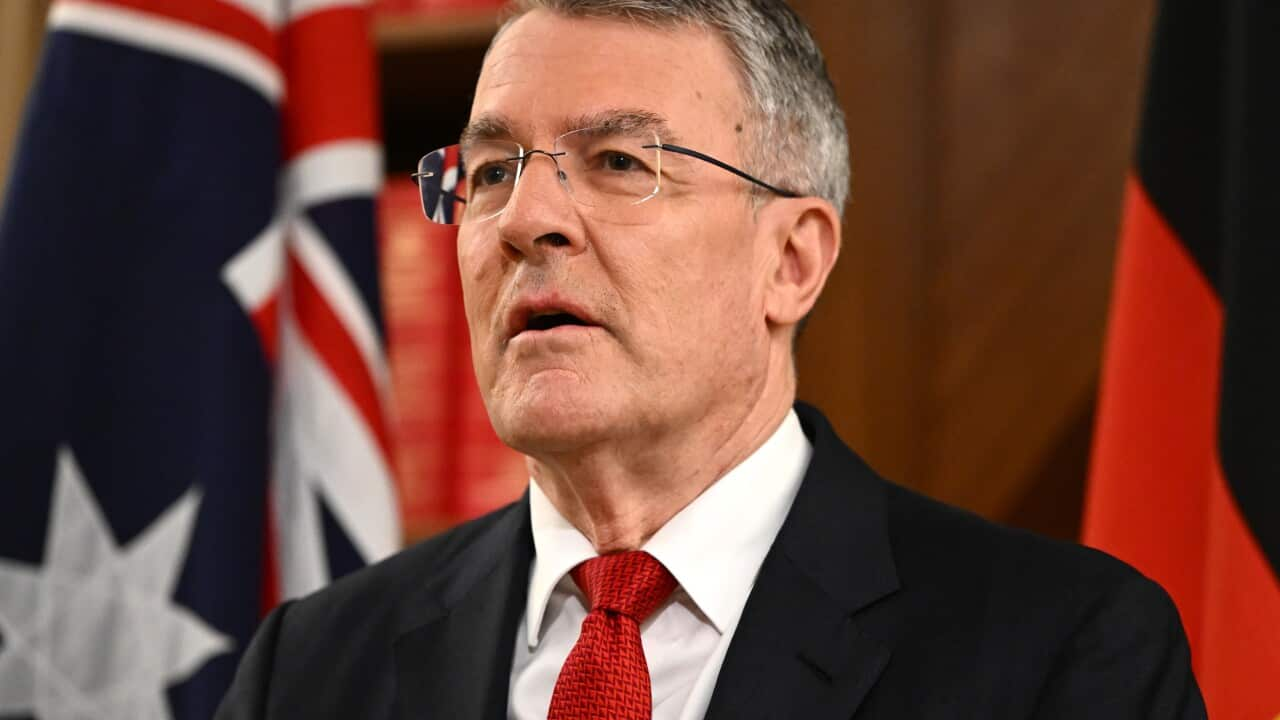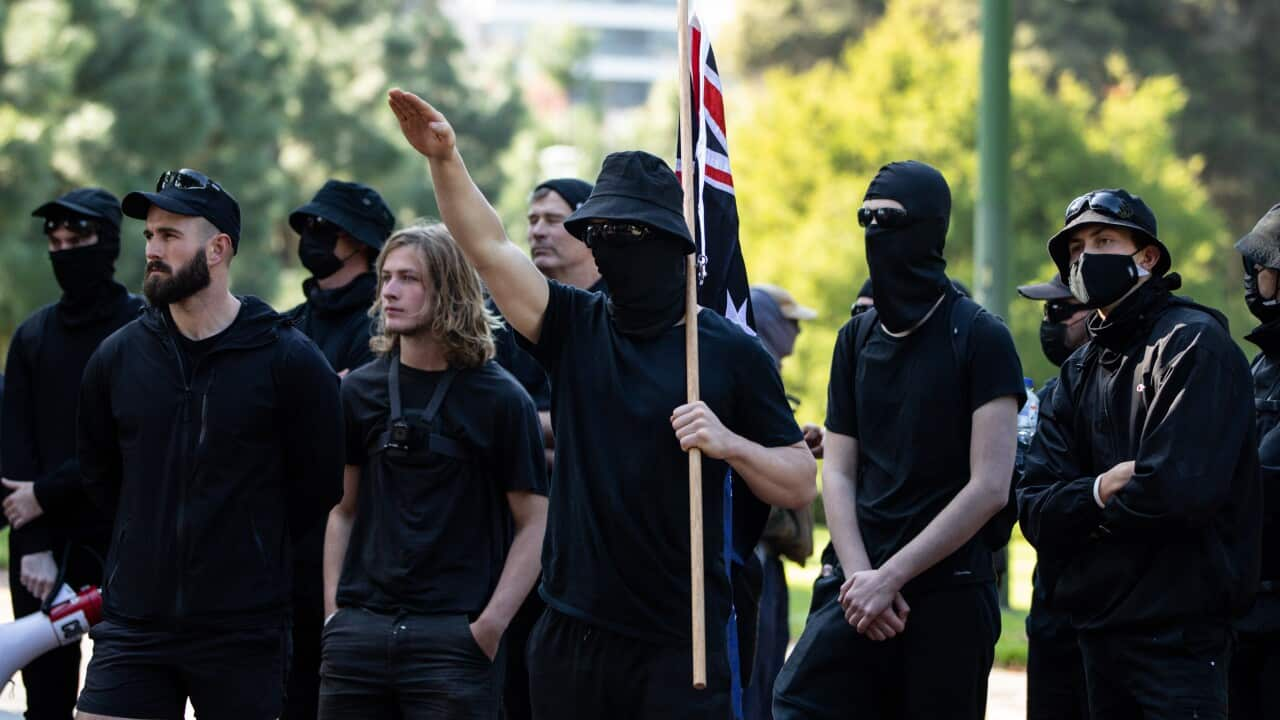KEY POINTS:
- Muslim groups raise concerns over some language in Labor's IS flag ban.
- The Australian Muslim Advocacy Network remains broadly supportive of the bill.
- Attorney-General Mark Dreyfus has been careful to distinguish IS from Islam.
Labor's plan to ban the flag of the self-proclaimed Islamic State (IS) includes "highly offensive" language and risks unintentionally leading to false police reports, says a Muslim advocacy group it consulted.
But the Australian Muslim Advocacy Network (AMAN) has welcomed the "tone and intention" behind Labor's bill and is "confident" the wording can be "better drafted" before it becomes law.
Introducing the Counter-Terrorism Legislation Amendment (Prohibited Hate Symbols and Other Measures) Bill to parliament on Wednesday, Attorney-General Mark Dreyfus in public and online.
But the bill also prohibits symbols "likely to be confused" with the flag, which includes writing commonly used by Muslims, sparking concerns of erroneous reporting by members of the public.
"You will find [that writing] in all sorts of forms, whether on a black flag, on a white flag … It's outside mosques. It's on people's necklaces," one senior Muslim spokeswoman has told SBS News.
'Imprecise' language prompts concern
The government consulted with the AMAN before introducing the bill, and Mr Dreyfus agreed to explicitly distinguish between IS and the Islamic faith.
AMAN policy advisor Rita Jabri Markwell broadly supports the plan, which shifts the emphasis away from harsh sentencing to lower-level offences with room for rehabilitation. She said Labor was "recognising the value" of Australian Muslims.
"We've seen in in the remarks of the Attorney-General ... recognising that IS has been a scourge on the world, but also particularly been a scourge on the Muslim community," she told SBS News.
But AMAN was not consulted on specific wording prohibiting symbols likely to be "confused with [or] mistaken for" the IS flag.

Mosques, like Dubai's Grand Mosque, commonly display the Shahada, which translates to: "There is no God but Allah, Muhammad is the Messenger of Allah". Source: Getty / Andia/Universal Images Group
After seeing the full bill, AMAN is part of a group of Muslim advocates now warning that language could prompt false police reports and encourage the public to "see a core tenet of Islam in a criminal light".
AMAN fears "imprecise" language could be introduced "into a field already marred by confusion and anti-Muslim bias".
“There is a whole bunch of everyday religious material that is so sacred to us as Muslims, which may be confused by police and by other members of the public," Ms Jabri Markwell said.
"We've already had that confusion for many years, which we're trying to repair, and we're afraid that this may be heading in the wrong direction.”
AMAN confident Labor will find 'the right balance'
The bill includes exemptions on religious grounds, given the swastika - significant to Hindus, Buddhists, and Jains - closely resembles the Nazi Hakenkreuz, which is set to be prohibited.
Police and the courts will be relied on to determine whether a symbol meets that threshold.

The IS flag, seen here being wielded by a supporter, was added to Labor's Nazi symbol ban.
That language also included the use of the phrase "global jihadist ideology", which AMAN described as "highly offensive".
Despite being co-opted by some violent extremist groups, "jihad" is mainly interpreted as a Muslim's internal struggle to live out the values of their faith.
“We don't want [extremism] to become what Australians think of when they think of 'jihad'," Ms Jabri Markwell said.

AMAN policy director Rita Jabri Markwell broadly supports the bill but wants more precise language. Source: SBS News / Stefan Armbruster
“We think that the inclusion of that term is really a backward step, and it's unnecessary. The government could refer to ‘IS ideology’ or things associated with IS. That [would be] a lot more precise.”
AMAN has also urged Labor to from Australia's counter-terror definitions, which it argued affirmed a distortion of Islam pushed by both IS and racist nationalists.
Mark Dreyfus says government 'consulted extensively'
A spokesperson for Mr Dreyfus said Labor had "consulted extensively" before introducing the bill and stressed that the PJCIS process was yet to play out.
"We would welcome AMAN and other groups with an interest in the bill providing submissions to that inquiry," they said.
Diana Abdel-Rahman, the executive member of the Canberra Islamic Centre, described the decision and its timing as “baffling”.
She also feared the potential impact of erroneous reporting.
“I think you'll have those who mistake the symbolism, there will be those who overtly want to [confuse] it to create chaos. It’ll be both,” Ms Abdel-Rahman told SBS News.
“The wording of that flag is an actual Islamic phrase and words that are used commonly in this mosque that we're sitting in right now.
“You will find it in all sorts of forms, whether on a black flag, on a white flag … It's outside mosques. It's on people's necklaces.”
Greens senator Mehreen Faruqi accepted banning the IS flag was reasonable but said prohibiting symbols that closely resembled it "needs to be carefully interrogated".
Senator Faruqi also questioned the timing of the move, which came nearly a decade after similar bans in Europe, and years after the fall of IS' so-called Caliphate.
"Unless there are clear protections for resembling symbols which are commonly used by Muslims, this could lead to wrongful policing and Islamophobia," she said.
"The far-right and white nationalism is a standalone problem that needs to be dealt with. For some reason, the government felt a need to drag Muslims into this very specific debate about Nazism."



